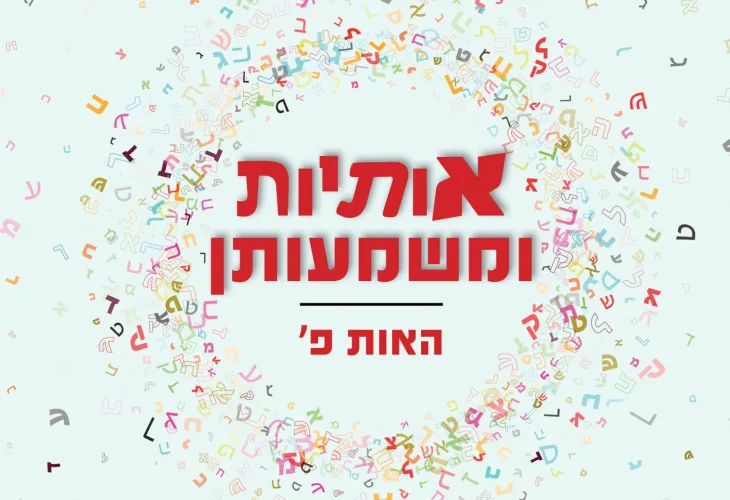Unveiling the Mystique of the Hebrew Letter 'Peh' through Torah and Kabbalah
The unique structure of the Hebrew letter 'Peh' houses the letter 'Bet' within, symbolizing the juxtaposition of inner spirit and external form. Discover how these ancient symbols articulate profound spiritual truths.

The essence of the letter 'Peh' lies in its pronunciation, "Peh," implying "mouth." The mouth symbolizes an opening to the external world, a gateway between the inner body and the outside.
In the Torah, the first word starting with 'Peh' is "upon" (פני), as in "hovering upon the face of the waters." The 'face' of something indicates its exterior, its surface, just as the human face reflects one's inner essence. Just as the mouth allows us to express emotions, the face reveals the heart's inner emotions. The Talmud in Tractate Shabbat also metaphorically connects 'Peh' to the idea of "mouth."
The form of 'Peh' resembles a small opening leading to an intricate interior. Interestingly, in the Assyrian script, the 'Peh' contains the form of 'Bet':

Anyone who looks at the Assyrian 'Peh' sees 'Bet' inside it. And what does 'Bet' signify? As we've seen, it symbolizes interiority, a home. Thus, 'Peh', representing the external face, frames the 'Bet', which is the inner spirit! The 'Peh' creates an aperture to gaze from the outside into the 'Bet', the interior.
Additionally, it's noted that 'Peh' is composed by materials detectable through the senses, matching the outer perception available to the senses, whereas 'Bet' is grasped only through thought and contemplation, just as true interiority is comprehended through understanding.
'Peh' holds a numerical value of eighty, aligning with our earlier discussions regarding the letter 'Chet', signifying the completion provided by the soul, the eighth spiritual dimension augmenting the seven physical ones. Indeed, the mouth connects the spiritual to the tangible by consuming food, transforming it into life, nourishing both the body and soul, and expressing the soul's wisdom through speech.
Consequently, 'Peh' often denotes emission and outward expression: to pour, to produce, to spread, to distribute, to redeem, to evacuate, to open a womb. It also implies creating an opening: the word 'open' itself, digging a pit referred to as "Pah," opening and spreading are forms of creating an entrance.
When the opening is closed, as illustrated with the letter 'Samech', then what's inside is "concealed." To place within a container is to "collect," within a group is to "affiliate." As such, the boundary becomes a "border," and breaking it is "exposure." Exposing a form is "sculpture," leading to "waste."
The letter 'Reish' signifies a foundational building block, so any approach to the core of an object or reality often goes through the letters 'Peh' and 'Reish': to separate, to unravel, to slice, to disassemble, to peel, to burst, also to breed, implying the division of one into two, and to unbraid, revealing and exposing, or to isolate, drawing one out from the collective. Hence, "wild," defying boundaries, unwalled cities, a flower blossoming from the decay of a seed, and "fruit."
The letter 'Tzadik' denotes exertion, so the combination 'Peh' and 'Tzadik' involves creating an opening through force: to crack, to wound, to explode, a "file," to "compensate" and to "split," meaning to peel through force.
The letter 'Lamed' conveys directionality, so when bursting through the exterior in a specific direction, streams are formed, differentiation, slicing and ejecting.

